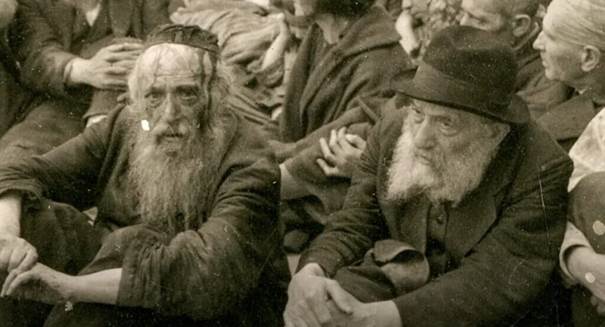A few words about usury as a national trade…
…”As a guarantee that a Jew would not engage in usury, the renunciation of Judaism was accepted, and a baptized Jew had no restrictions in moving around the country and choosing a place of residence.”
In view of the fact that the Middle East will not calm down in any way, the topic of Jews is periodically raised on my channel, readers ask questions, as a rule, not about what is happening there, but about Jews in Russia…
Indeed, it is traditionally accepted in our country that the Pale of Settlement, i.e. the zone in which Jews lived en masse at the time of the annexation of the western territories to Russia, was almost a ghetto, from which Jews were not allowed to leave.
In fact, a Jew could go anywhere from the Pale of Settlement, even to the Urals, to Siberia, or to the Far East. But under certain conditions, the main of which is that he should not engage in usury.
Otherwise, yes, the Jewish usurer was not allowed to leave the Pale of Settlement and was not allowed to live in large cities.

But if the Jew had nothing to do with usury, but was, for example, a scientist, an engineer, a doctor, a retired military man. Even if he had no education, was a simple craftsman, there were practically no restrictions for him.
At different times, the laws of the Russian Empire in relation to the Jews were sometimes tightened, then weakened, but one thing always remained unchanged: as a guarantee that a Jew would not engage in usury, the rejection of Judaism was accepted. A baptized Jew had no restrictions on movement around the country and the choice of place of residence.
It is not customary to talk about this, since it does not fit into the legend of the oppressed people, but all the laws restricting the rights of Jews in Russia were in one way or another connected with their, let’s say, specific commercial activity, namely usury.
When we talk about usury, we need to understand that in this case, we are not just talking about the transfer of money for growth, but about the fact that usurers have always taken collateral. As a rule, these were some valuables, and the usurers gave to those who applied to them an amount on average four times less than the real value of the collateral.
The expectation was that people who found themselves in a difficult situation could not redeem the pledged things, and then the pledge went to the usurer. This was his main income. This was also the object of people’s hatred for the usurer, because it was enough to delay the payment for one day and the pledge went into his ownership.
Of course, usury was practiced not only by Jews, but only in their national environment it was not condemned in any way and was not considered a sinful deed, unlike Christian traditions.

Expelled from Palestine by the Romans, the Jews were scattered throughout the world, but it was difficult for them to find their place everywhere. They were indeed oppressed, forbidden to join craft guilds, engage in agriculture, and so on.
At the same time, Christianity, which spread throughout Europe, was very disapproving not only of usury, but also of money and wealth in general.
The Apostle Paul directly pointed out that money is evil, bringing his thought to the conclusion that it is sinful to earn it.
… Those who desire to be rich fall into temptation, and into a snare, and into many foolish and harmful lusts, which plunge men into calamity and destruction. 1 Timothy 6:9
For obvious reasons, all these Christian troubles did not really bother the Jews, moreover, in Judaism the attitude to money is fundamentally different from the Christian. Jews do not have a tradition of renouncing wealth, they do not take vows of poverty, and they do not renounce money, which is only a tool for them to maintain their standard of living.
For this reason, at the beginning of the first millennium, usury became the main occupation of the Jews. As Christianity expanded in Europe, so did the presence of Jewish moneylenders, who became the ancient prototype of modern commercial banks.
People used the services of usurers, but at the same time they hated them fiercely, and there were good reasons for this, which I mentioned above. Starting from the rejection of usury by Christianity, ending with the pathological greed of the usurers themselves. As a result, the Jews were constantly being dealt with…

The first documented pogrom against Jews occurred in 1096 in Rouen, France. Subsequently, pogroms occurred with enviable regularity throughout Europe, especially at the time of the Crusades, i.e. at the time of the maximum flowering of religious fanaticism.
But despite the pogroms, Jewish usury flourished, the reason being that at the end of the 12th century, the Catholic Church officially established a ban on usury, punishing Christian usurers with excommunication.
The Jews, for obvious reasons, were not frightened by this punishment, they still went about their business, and in the end, a cause-and-effect relationship was firmly established in people’s minds, if a Jew, then he must be a usurer, which in fact was not far from the truth.
Having accumulated considerable capital on usury, it was the Jews who became the founders of the first banks and international financial institutions.

Over time, with the change in the attitude to finance in Christianity, the role of Jews in banking became less noticeable, but they are still the main financial tycoons of this world.
To make sure of this, it is enough to look at the list of names of the richest bankers in the world. They all trace their origins to Abraham, Isaac, and Jacob.
Sincerely, Lev Valerievich.
